Oppressed Peoples Online Word...The Voice Of The Voiceless
Dedicated to disseminating news & information not found in mainstream media....
African American History: Ibrahim Omar Franz Fanon The French thinker who fought against colonialism in Algeria and the world..... رحمة الله عليه
Fanon saw violence as the only language colonizers truly understand. Through violence, imperialists instilled a sense of inferiority in the colonized, and it was therefore through violence that the colonized could regain a sense of self, a sense of culture, and the physical reality of statehood
الله يرحمه ويغفر ذنوبه
Fanon's basic assumption—that colonialism is a machine of “naked violence,” which “only gives in when confronted with greater violence”—had become uncontroversial across Asia and Africa wherever armed mutinies erupted against Western colonialists.
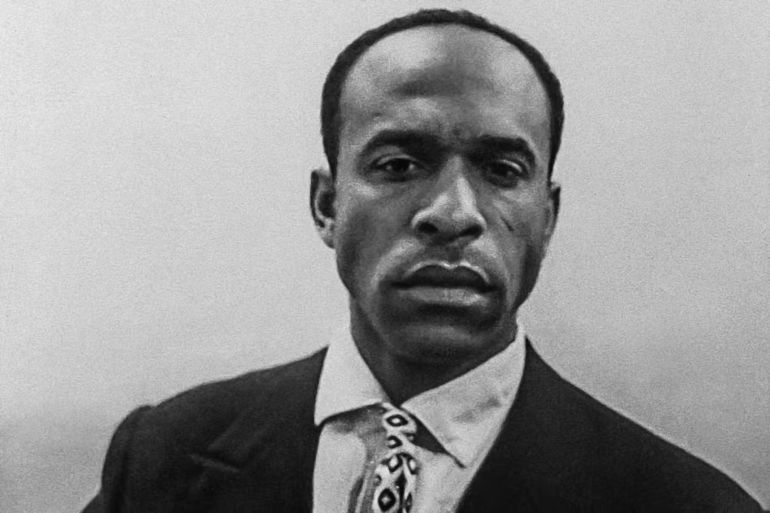
Frantz Fanon is a French-Algerian physician, activist and philosopher born in 1925, who joined the Algerian National Liberation Front and wrote about the issues of colonialism and its de-colonization, looking at the revolution of the peoples and the dismantling of the alienation (social alienation) that colonialism causes to its victims.
His ideas inspired militants in Africa, Asia and Latin America, and marked the first field of "postcolonial studies" focusing on what the colonizer left to exploit indigenous peoples in colonized lands, and his death in the flower of his youth in 1961.
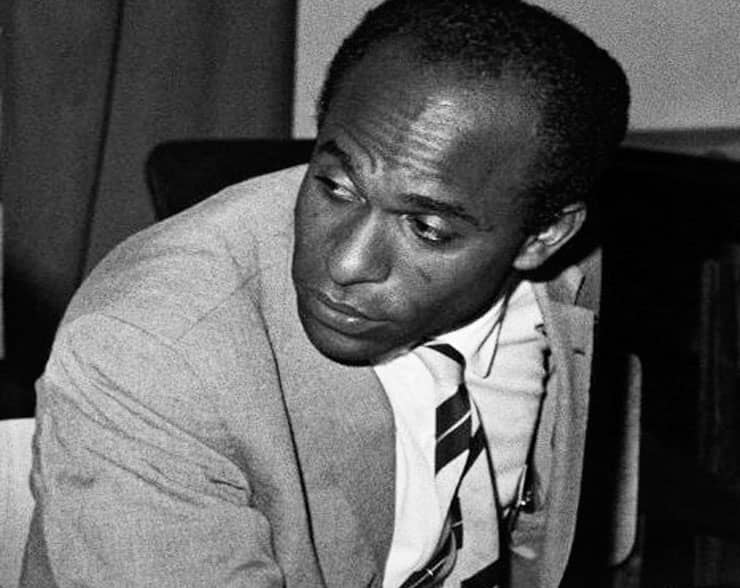
Fanon joined the French army in World War II and was a turning point in his thought (social media)
Birth and upbringing
Frantz Fanon was born on July 20, 1925 in Fort-de-France on the Caribbean island of Martinique, part of the French Overseas Territory.
His family belonged to petty bourgeoisie: his father, Casimir Fanon, worked as a customs inspector, his mother Eleonor Felicia Medlis was a merchant, and Franz was fifth among eight brothers and sisters.
In a biography of his life, his brother Joby Fanon describes the atmosphere of his upbringing, where their father was deeply convinced of the importance of studying and urged them not to be satisfied with what they received from teachers.
Despite the family's financially comfortable situation, Jobe describes the city that embraced Frantz's childhood and adolescence as a "failed city" where the manifestations of poverty were shocking.
Study and training
Fanon studied in his hometown of Schwilshire High School and became addicted to reading in its library, where he became acquainted with the writer and politician Amy Césaire, who was then a teacher there, although he did not study with him directly.
He applied early for his high school diploma, decided to retreat in the library and focus on reading to Renaissance writers, and his brother Jobi describes how Franz used to memorize by heart long passages of these readings.
Franz succeeded in the written part, but was initially excluded from the oral part of the exam, and later obtained his high school diploma after returning from his first attempt to volunteer in the Free French Forces, an attempt he began on July 13, 1943 despite the opposition of those around him, as he viewed the war in his environment as "a war between whites that does not mean anything to the colonizers", but justified his position by saying, "Wherever freedom is affected, I feel that I am concerned, we are all concerned no matter what. Our colors were white, black or yellow."
Coverage of World War II reached Martinique on radio and followed closely by Fanon, then he joined the Fifth Battalion of the Free French Forces and sailed with them on March 12, 1944, to North Africa.
Although he and his comrades were tired of training and routine military instructions "because they had joined the army to fight the Germans", he proved his worth on the battlefield and was praised and encouraged by his commanders, but he was wounded during the battles near Geneva, spent a period between treatment and convalescence, and returned to the front.
Fanon was discharged on May 18, 1945, after France's war against Nazism was completed, returned to Martinique on September 12, 1945, and during his conscription experience experienced anti-black racism and became more aware of colonial issues.
After returning from the battlefront, Fanon received a scholarship that was available to those who fought in the war, then moved to Lyon, France, where he began studying medicine, and in addition to his studies, he continued to attend lectures in philosophy and literature, and participated in student activism.
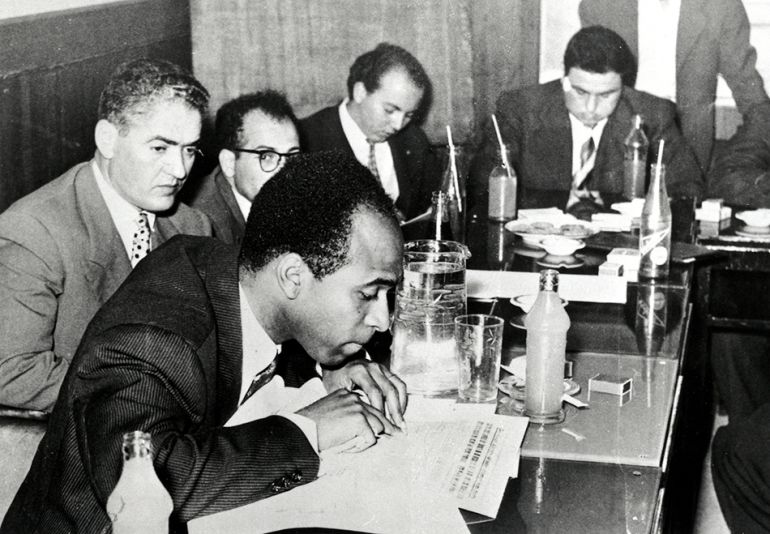
Fanon announced his resignation from the medical profession in protest against colonial practices, so France decided to exile him from Algeria (foreign press)
The experience of Algeria
With his graduation as a doctor, he wanted to work in his native Martinique, and because there were no vacancies, he tried to join a sub-Saharan African country, but eventually moved to work at the Blida Hospital in Algeria, where he arrived in December 1953, about a year before the outbreak of the liberation revolution on November 1, 1954.
Coming from a colonial country, he recognized himself in another country occupied by the same colonial power, according to his wife, Josie Fanon, and his work as a psychiatrist and his contact with patients and nurses gave him an understanding of the situation, and soon he saw firsthand the psychological effects of colonialism, not only on its victims under oppression and torture, but also on its soldiers involved in torture and atrocities.
Fanon worked for years in the treatment of the mentally ill, and applied new methods in psychotherapy, such as the abolition of the use of the "jacket of the insane" that was widely used before the discovery of neurological tranquilizers, and adopted means related to the culture of patients such as games, singing and stories, and rejected the racist medical concepts that prevailed at the time, such as relying on the shape of the skull and others.
In addition to his medical mission, he worked as a scalpel in the reflection and anatomy of the phenomena of colonial reality with which he was in contact, and the young doctor gradually began to approach the National Liberation Front, with which he had contacts and contributions, and ended up resigning from the medical profession through a letter in which he criticized the practices of colonialism and its "hatred" against Algerians.
"I can say that I have been placed at this crossroads and I stood terrified of the magnitude of the alienation suffered by the inhabitants of this country, and if psychology is the medical means that seeks to allow man not to feel alienated in his environment, I must confirm that the Arab who is always alienated in his country lives in a state of absolute uprooting of personality," he said
After his resignation, the colonial authorities issued a decision to expel him from Algeria, so he joined the National Liberation Front in Tunisia and worked for its media outlets, including the newspapers "Algerian resistance" and "El Moudjahid".
Fanon assumed diplomatic missions for the Front, where he was its representative in sub-Saharan African countries, during which time he traveled with a passport issued by the Kingdom of Libya in the name of "Omar Ibrahim Fanon".
Map of Morocco, Algeria, Tunisa and Libya: Political Map of Algeria - Nations Online Project
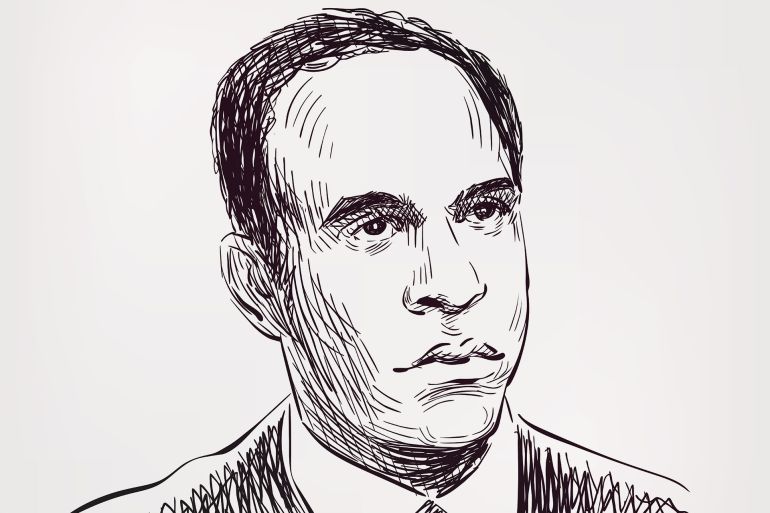
Fanon was keen to convince the colonizer that there was no favor on him from the colonizer to achieve his independence (Shutterstock)
Against racism
The shape of the book "Black Skin... White Masks", published by Fanon at the age of 27 in 1952, is his first intellectual work, and the book shows his ability to use the tools of different fields of knowledge, such as psychoanalysis, philosophy, linguistics, literature and early concepts of the "Negro" current to analyze the state of collective neurosis caused by colonialism.
In the book, Fannon attempts to understand the foundations of anti-black racism in consciousness and society, and his ideas about anti-black racism and how to "shape and then distort" the subjectivity of both black and white together represented a basic precursor to understanding the multiple levels of colonial oppression and the conditions for overcoming it.
Later, the experience of Algeria and sub-Saharan countries broadened Fanon's interests, and after focusing on anti-black racism in his first work, he made a shift with his 1961 book The Wretched on Earth, which addressed colonialism as a broader issue affecting the oppressed in the southern part of the world.
From patriotism to humanity
Fanon seemed keen to convince the colonizer that colonialism had no favor on him in the path to independence, since "what the colonizer obtains through political and armed struggle is not the result of the colonizer's goodwill or the goodness of his heart," but rather a translation of the fact that the colonial power now sees postponing concessions as impossible.
He did not fail to pay attention to the loopholes that enable colonialism to continue, and he seemed suspicious of what the national parties are witnessing from "the coexistence of the will to break colonialism with another will, which is friendly understanding with it", and even happens, as he says, that colonialism leaves areas that have not been sufficiently exposed to the tremors of the struggle for freedom, and we find "cunning intellectuals" maintaining the behaviors and forms they received during the experience of the colonial bourgeoisie as they are unchanged.
Fannon understands the invocation of national and local identities in resisting colonialism, but stresses the need to go beyond patriotism in the end towards a human struggle, because struggle is what makes change that is not brought about by simply "showing a culture or traditions from the past", colonialism "will not feel shame if we present unknown cultural treasures before its eyes", he says, and to avoid these consequences, Fanon suggests paying attention to the countryside and focusing on educating the masses "who can lead themselves by themselves."
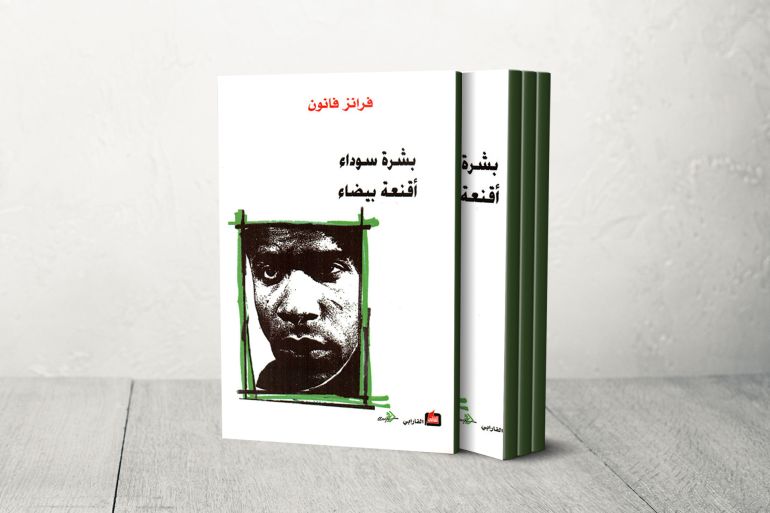
The book "Black Skin... "White Masks" by Dr. Frantz Fanon is one of the most influential books in postcolonial studies (social media)
Business & Impact
Fanon's influence exceeded his limited production in number, as his intellectual activity lasted only about a decade, something that does not compare to other thinkers, according to John Drabinsky, who edited a lengthy essay on Fannon in the Stanford Book of Philosophy.
Fanon does not seem to have taken into account the profound impact of his ideas, whose central concern was the liberation of man, since, as quoted by his wife, he hoped to continue working as a psychiatrist and did not aspire to be a politician.
His book "Black Skin... White Masks" and "The Wretched in the Earth" are his most important works, while the rest of his books were collections of separate articles and studies, some of which were published posthumously, although his impact was great, as activists in Latin America relied on his visions, as happened in Africa and South Asia.
At the academic level, his thought influenced Edward Said, Ali Shariati and others, and his influence in cultural studies was tangible, and his concepts were used to address issues of race, nation, immigration and others, and the most prominent works of Fanon were:
- "Black skin. White Masks", published in 1952.
- "The Fifth Year of the Algerian Revolution", published in 1959.
- "The Wretched in the Earth", published in 1961.
- "For the African Revolution", published in 1964.
- "Texts on Dispossession and Freedom – 2011 Collection".
- "Texts on Dispossession and Freedom – 2018 Business Collection 2".
Death
Fanon died on the sixth of December 1961 in the United States of leukemia at the age of 36, and his body was transferred to Tunisia and from there to Algerian territory according to his desire, where he was buried in the Martyrs Square in Ain Karma in the El Tarf region northeastern Algeria.
It should be noted that because of the despotic nature of the French during that era, they refused to allow his body to be buried in Algeria, As Allah would have it, he was buried in the Martyrs Square in Ain Karma (Martyr Square In Algeria) which was at that time part of Tunisia. In later times it became part of the Northeastern region of Algeria. So not only was he buried in Algeria as he wished, he was honored to be buried in the Martyrs Square.
The Doctor Ibrahim Frantz Fanon
الله يرحمه ويغفر ذنوبه
آمين يا رب
Full article: Frantz Fanon. French thinker who fought against colonialism in Alge...
Views: 221
-
Comment by Bilal Mahmud المكافح المخلص on June 17, 2024 at 7:29am
-
Ibrahim Omar Frantz Fanon
Discover the connections between Ibrahim Omar Frantz Fanon's work and the situation in Gaza, Palestine. Explore the impact of colonization, resistance, and liberation in this thought-provoking video.
https://www.youtube.com/watch?v=o9s8p5CQ44o
More On Resistance In Gaza
Comment
- ‹ Previous
- 1
- 2
- Next ›
© 2024 Created by Bilal Mahmud المكافح المخلص.
Powered by
![]()
You need to be a member of Oppressed Peoples Online Word...The Voice Of The Voiceless to add comments!
Join Oppressed Peoples Online Word...The Voice Of The Voiceless